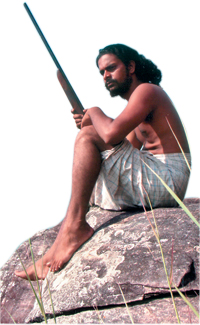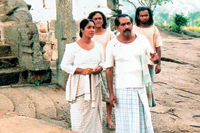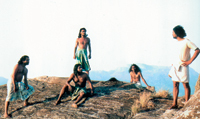| |
||||||
| Sudath’s ‘Saradiel’ to hit TV One hundred and forty two years after he died at the end of British hangman's noose, the legendary Sinhala folk hero Utuvan Kande Saradiel will ride again, this time on television screens in thousands of Sri Lankan homes, thanks to a new tele-epic now being filmed.
The serialization of the story of the man dubbed a local Robin Hood by his adversaries, the British administrators of 19th century Ceylon, is sponsored by Swedeshi Industrial Works, the indigenous pioneer in the manufacture of personal care products. According to Director Sudath Rohana, a veteran of 20 well received teledramas, this will be the biggest tele-production in Sri Lanka to date in terms of budget. Scores of present-day residents, still in awe of the dashing outlaw whose exploits brought fame to the village of their ancestors, recently climbed to the base of 'Saradiel's seat,' a distinctive landmark on the Colombo- Kandy Road, to watch spellbound as a Sri Lanka Air Force helicopter circled the rocky pinnacle of Utuvan Kanda to film the last stand of their hero. Scheduled to be telecast by the Independent Television Network (ITN) beginning late September, the evocative 30-episode drama stars many popular and accomplished local artistes. The star-studded cast led by Ravindra Roshan (Saradiel) includes Jayalath Manoratne, Champa Sriyani, Tissa Abeysekera, Sathischandra Edirisinghe, Jagath Beneragama, Janak Premalal, W. Jayasiri, Indika Upamali, Umayangana Wickramasinghe, Udeni Chandrasiri and several other accomplished actors in support roles. 'Utuvan Kande Saradiel' is the first ever tele-drama about this controversial character, whose daring campaign of robbing the rich to help the poor made him a thorn in the side of the British, a brigand to the wealthy people of the day, a protector of the down-trodden to the poverty stricken, a crusader against injustice to many and a freedom fighter to some. ‘There are many conflicting portrayals of Saradiel’ said director Sudath Rohana.
Born in 1832 to Haldaduwana Dikiri. Kewage Adasi Appu and Utuwan Kande Molligoda Pichohami, Saradiel was 16 years old when the 1848 rebellion of Puran Appu and Gongalegoda Banda took place. Instead of joining the rebels, he launched his own campaign against the administration, and is believed to be the first to employ guerrilla fighting tactics against the British. The drama poignantly brings to life how at a very young age Saradiel is sent to the village temple for his education. He steals a bottle of 'Henaraja Thylaya', a charmed oil from the priest and runs away. He undergoes weapons training at the Colombo Army Barracks and decamps with the weapons and begins his life as an outlaw. He is arrested but escapes from prison with ease. A price is placed on his head and in 1863 the Hingula Police Station is set up expressly to counter the raids of Saradiel. Betrayed by his friend Sirimala, Saradiel is captured and hanged in public on 7th of May 1864. To this day, many people believe that the oil he stole from the temple protected Saradiel from the bullets of the British army and police. The fast paced action and historical narratives is coloured with Saradiel's romantic liaisons, in particular his relationships with Sirimali, a village damsel. Director, Sudath Rohana has produced and directed many teledramas and is best known for Avindu Andura, Katu Imbula, Ambu Daruwo and Wikumsiha Katandara taken from Mr. Martin Wickramasinghe's short stories. 'Utuvan Kande Saradiel' is based on a screen play by Somaweera Senanayake, while cinematography is handled by K.A. Dharmasena. The Senior Assistant Director is Prasanna Ittepana. Among the locations used for the teledrama are
Utuvan Kande and its environs, the Bogambara prison, Colombo and
Kaltota in Balangoda. An important aspect of 'Saradiel' is that
the story is based on historical facts gleaned from many sources. |
||||||
Copyright © 2006 Wijeya Newspapers
Ltd. All rights reserved. |
||||||


